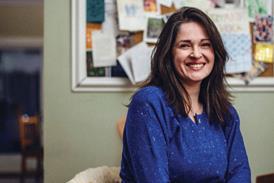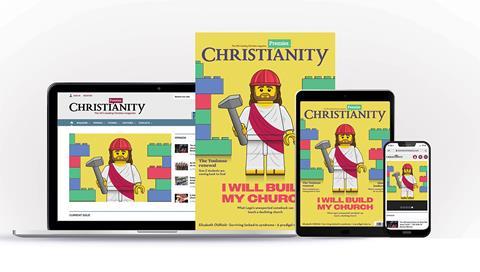Against a backdrop of complaints about the cost to the taxpayer and the child abuse scandals, the Pope is about to make an official visit to the UK. We examine the reception he is likely to get, and significance of his visit for all parts of the church in this country
Last month the Guardian ran an online competition to see who could design the best T-Shirt for the Pope’s visit this month. One of the six winner’s T-shirts featured the following words: ‘The Papal visit to the UK 2010: we’re working hard to avoid controversy’. It reflects the turbulent time the Catholic Church has had this year, prompting humanists to protest his visit. UK Catholics, however, are adamant that Benedict XVI’s time here will be a blessing. Many see the child abuse stories as a secular attack on Catholicism, and remain determined that the Pope’s visit will be one of encouragement.
Pope Benedict XVI, Joseph Alois Ratzinger, is the 265th man to take the title of Pope; the word Pope literally means ‘father’. He is, therefore, the head of the Catholic Church and also Sovereign of the Vatican City State. Born in Bavaria, Ratzinger quickly ascended church ranks and was recognised for his academic gifts and work ethic. In 1977 he was appointed Archbishop of Munich and Freising and also appointed Cardinal by Pope Paul VI. Four years later he became the Prefect of the Congregation for the Doctrine of the Faith (CDF) – one of the most honoured roles in the Vatican. When John Paul II died in 2005, Ratzinger was appointed Pope at age 78, the oldest Pope since the 18th century.
On September 16th Benedict XVI will fly to Scotland to be received by the Queen in the Palace of Holyrood House in Edinburgh. On the first day he will celebrate Mass before 100,000 people in Bellahouston Park, Glasgow. The next day, he will meet the Archbishop of Canterbury, Dr Rowan Williams, before addressing representatives of British Society in Westminster Hall. On September 18th, Benedict will celebrate Mass in Westminster Cathedral and finish the day at an open air vigil of prayer in London’s Hyde Park. On his last day, Benedict will travel to Birmingham for the beatification of Cardinal John Henry Newman in Cofton Park.
For many readers of this magazine (particularly those who are evangelical, charismatic or Pentecostal Christians) even without the abuse allegations, the Pope’s visit is not high on the agenda. Many will not believe in apostolic succession and beatification. Most will believe that anyone who trusts in Jesus is automatically a saint without having to be canonised. Nonetheless, there are those who argue that the Pope’s visit is of immense significance, not just for Catholics.
The Archbishop of Westminster, Vincent Nichols, head of the Catholic Church in England, says Benedict XVI will come with a clear message. ‘If I had to sum up the hope for this visit, and I believe a fundamental intention of the papacy of Pope Benedict XVI, it would be in this sentence: It is to show that faith in God is not a problem to be solved but a gift to be rediscovered,’ he says. ‘I think in many ways in our country we have got ourselves in a bit of a cul de sac of thinking that faith in God is nothing other than a problem to be solved, whereas I hope this visit will help all of us to just remember again that in fact it is a gift, and one that inspires and moves people to often their greatest achievements and their greatest generosity.’
Ann Widdecombe, former Conservative MP for Maidstone and the Weald, is a committed Catholic who converted from Anglicanism. She says she is ‘immensely looking forward’ to the visit and hopes Catholics would be allowed to enjoy it in peace. ‘This is a massive thing for Catholics’ she says. I think it will give the Catholic Church an enormous boost.’
Things which unite… and divide
One of the focal points of the Pope’s visit – and perhaps the thing which causes the most consternation among non- Catholics – is the beatification of Cardinal Newman. Newman was an Oxford Catholic priest and poet who converted from the Church of England to Catholicism. He was a member of the highbrow Oxford Movement and, before his conversion, pushed the Church of England towards a more Catholic position. His beatification is the Catholic Church’s way of saying that Newman is now in heaven and that Catholics can pray to him. His beatification is a double honour as the Pope rarely beatifies anyone himself and normally relies on his bishops to conduct the services.
Charles Whitehead, chairman of the International Charismatic Consultation of World Evangelism, is a wellknown charismatic Catholic. He met the last Pope frequently and received a Papal Knighthood from him in 2003. His take on the beatification of Newman is to focus on his teaching. ‘I think the significant thing about him is that his teaching was very clear about the gospel message and about the nature of the church and it was well ahead of what people were thinking in his days. He was very aware of the kind of church that the Catholic Church has become today and he wanted it to make that progress – so his teaching was very ahead of its time and very challenging in a very positive way.’
Ann Widdecombe believes that Protestants and Catholics need to forget some of their differences as they face an increasingly intolerant secular voice. The papal visit will be good for this, she thinks. ‘Gradually Christians are beginning to realise that it is a waste of time to fight each other. I think the negativity between the two positions is declining…I know that there will always be some residual resentment and distrust there but, on the other hand, I think the two churches work together better than they have ever done.’
One of the extreme controversies facing Benedict XVI is the fact that he was accused of protecting disgraced priests in his position at the CDF. Widdecombe says her church had been wrongly derided. ‘The fact is that if one child had been abused by one priest that would be far too many but the reality is this horrible thing is not just restricted to the Catholic Church, it happens in all denominations but it also happens in secular professions. It happens massively in teaching, in children’s homes and in areas like that, so there is no need to pick on the Catholic Church, and suggest that it is something unique to the Catholic Church. It certainly isn’t.’
Earlier this year, in an attempt to diffuse the child abuse allegations, the Pope sent a Pastoral Letter to the Catholic Church in Ireland – where many of the worse cases originated. The letter voiced his sorrow and promised changes to the way abuse cases were handled. However, for many, this is not enough. Human rights activist and gay rights campaigner Peter Tatchell is part of a group protesting against the Pope’s visit. Armed with placards they will draw attention to the abuse allegations. But they will also raise other issues. ‘The Protest the Pope campaign is calling on the British government to disassociate itself from the Pope’s intolerant teachings on issues such as women’s rights, gay equality and the use of condoms to prevent the spread of HIV,’ he says. ‘On these and many other issues, Benedict is out of step with the majority of British people, including most Catholics. We also object to his visit being funded by the taxpayer.’
Protestants – including a group from the right wing English Churchman newspaper – will also be protesting his visit, this time over doctrinal issues. ‘There is still quite a lot of anti-Catholic feeling in this country,’ says Charles Whitehead. ‘You only have to scratch people a bit and it begins to emerge. I think it is history. Not just the reformation but everything around that whole period has just continued and it caused, until not more than 50-60 years ago, the Catholics in this country to kind of keep their heads down rather than feel that they could talk about faith personally and so on. There was quite a lot of negativity. I think a lot of that has now been addressed.’
Anglo Catholic Relations
The papal visit is a good opportunity to evaluate relationships between Anglicans and Catholics in the UK. On one hand it shows a great willingness for Anglicans to cooperate with Catholics, as demonstrated by both the Archbishop of York and Canterbury welcoming the Pope’s visit. However, it also shows up some of the mistrust and disagreement over core doctrines. During the 60s, 70s and 80s Anglicans and Catholics seemed – at least on the surface – to be getting along better. This was demonstrated mainly by the Anglican- Roman Catholic International Commission – known as ARCIC. These were a series of talks and papers started in March 1966 by Pope Paul VI and the then Archbishop of Canterbury, Dr Michael Ramsey. Between 1971 and 2003 numerous papers were published on the Eucharist, Christian ministry, doctrines of salvation, communion and the role of Mary. The process continued peacefully until 2003 when Anglicans in America made a practising homosexual, Gene Robinson, a bishop. This prompted Pope John Paul II to suspend any talks between the two churches. Meanwhile moves by the Church of England to introduce women bishops heralded more Catholic mistrust of Anglicans. ARCIC talks have now resumed but have suffered because of these issues.
One of Britain’s most well known Anglo Catholics is the Bishop of Fulham, Rt Rev John Broadhurst, a staunch traditionalist. ‘ARCIC still meets up but I think the process is going backwards and it will go backwards until the Church of England repents,’ he says. ‘How are Catholics supposed to deal with the Anglican Church when they are consecrating women as bishops and not only that but also consecrating practising gays? In matters of order and morals the Anglican Church is going in a very destructive way.’
His scepticism is more understandable when we consider the current position of Anglo Catholics. Many hold similar convictions to Bishop Broadhurst on homosexuality and women bishops, however they have remained Anglican in the hope that when the Church of England appoints women bishops – considered inevitable – sufficient provisions would be made allowing them to serve under male bishops. However, following this year’s Synod meeting in York, there is now much less hope of this. Last year the Pope created a route – called the Ordinariate – enabling Anglo Catholic priests opposed to women bishops to join the Catholic Church. In a letter signed by 15 Anglo Catholic bishops, it was made clear that many Anglican bishops would be taking this way out of Anglicanism, most likely immediately after his visit.
Despite the protests and the continuing tensions between Anglicans and Catholics, September is set to be a special month for UK Catholics. The papal visit will attract controversy, but hopefully it will remain peaceful. Meanwhile, many evangelicals, charismatics and Christians from other sections of the church will be divided over the visit. Personally, I have my own evangelical convictions and therefore have difficulties with some papal doctrines. However, in this case, I aim to involve myself in some way with Benedict’s visit. After all, we should not forget that almost 1,500 years ago Christianity came to this island by missionaries sent from Pope Gregory the Great. To disengage with the Pope’s visit is to not only reject the head of a legitimate state, but also to neglect part of Britain’s religious heritage.



























